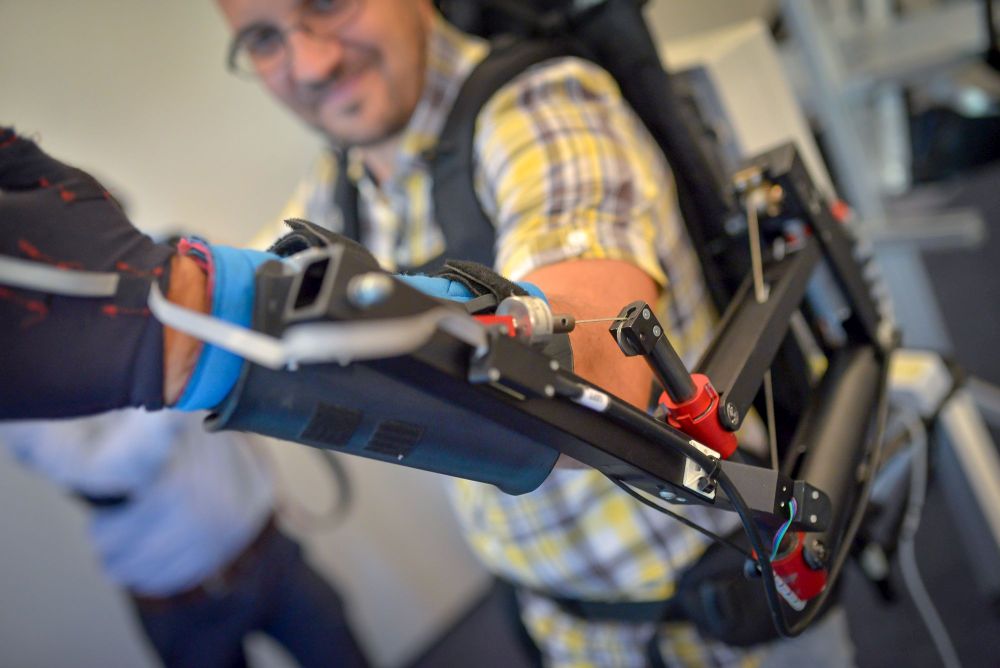Robo-Mate shows how exoskeleton can protect workers and increase industry’s competitiveness
On 30 August, the Robo-Mate project presented the final prototypes of its three exoskeleton modules to companies in Sibiu, Romania. Two features make the presented exoskeleton unique: It is designed for manual handling tasks and its modular concept makes it suitable for many tasks that involve lifting, carrying or holding objects up to 15 kg.
Robo-Mate consists of relatively lightweight modules (two module types for the arms, one for the trunk and on e HMI module) that can be combined to suit different tasks in industries which rely on manual handling of objects. Application areas include, for example, assembly and disassembly in the automotive industry, luggage handling at airports or moving objects in logistics companies.
How the modules work
Representatives of various companies came to Sibiu to see and try Robo-Mate’s prototypes of four modules: passive arms, active arms, trunk and HMI. The passive arms module is driven solely by springs and provides a constant lift to the arms. The active arms are driven by small motors that provide a variable lift to the arms. The trunk module is operated by motors as well and reduces compression forces in the lower back by applying a supporting force to the hips and the upper body. The HMI supports the worker to interact with the exoskeleton and can be integrated with the company’s production and resource planning system. It can also be used to display, for example, assembly instructions for the worker.
Flexible to suit different tasks
Because of the constant lift, the passive arms are suitable for working with a heavy tool or other tasks where workers handle a constant load. It is intuitive to use and does not need any power supply. For pick and place tasks, on the other hand, the active arms are more suitable, because the control system can adjust the supporting force to the weight, which is detected by sensors in gloves and shoes. If workers have to bend over or hold static positions with a bent back, the trunk modules comes into play: It reduces compression forces in the lower back and thus has the potential to reduce the risk for back injuries.
Promising first test results
The modules have been tested by the industrial partners of the Robo-Mate project: Centro Ricerche Fiat, Indra Automobile Recycling and the automotive components company COMPA. Tests in the laboratories of Robo-Mate and digital factory simulations have also shown that the arm and trunk modules have the potential to reduce compression forces to the lower back and reduce perceived exertion of workers. This can improve competitiveness and protect workers from injuries: Workers can work faster or longer and they make fewer mistakes caused by fatigue. The exoskeleton modules can also protect workers from injuries of the lower back, which reduces suffering of workers and costs for companies.
From prototype to product
Many companies have expressed interest in testing the Robo-Mate prototypes. One of the Robo-Mate partners, MRK Systeme GmbH in Germany, plans to produce and lend prototypes to companies. With their input, the prototypes will be further developed to suit the companies’ individual needs. Other partners are planning follow-up R&D projects to further develop and improve the Robo-Mate modules and exploit the technologies developed for Robo-Mate.

About Robo-Mate
Robo-Mate is a European research project that comprises 12 partners from 7 European countries, including key players from industry and academia. The project started in September 2013 and will end in November 2016. The fundamental idea behind Robo-Mate is to improve work conditions for workers and facilitate repetitive lifting tasks, thereby reducing the incidence of work-place related injury and disease. As a consequence, productivity, flexibility and the quality of production will be increased.
The project is funded with €4.5 million by the 7th Framework Programme for Research and Technological Development of the European Union (FP7) and is led by Prof. Dr. Hans Wernher van den Venn, Head of the Institute of Mechatronic Systems (IMS) at the Zurich University of Applied Science, Switzerland.
Further information: www.robo-mate.eu
Contact
Dr. Gabriela Cândea
+40 269 231 037
gabriela [dot] candea [at] ropardo [dot] ro
ROPARDO S.R.L., Romania
www.ropardo.ro
